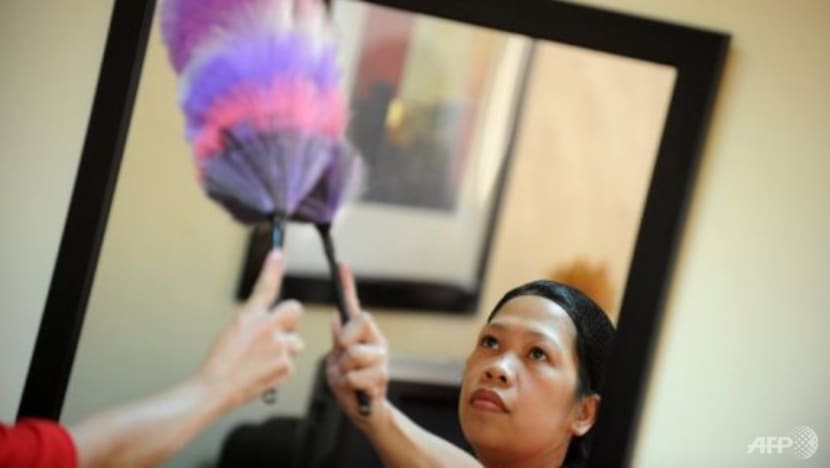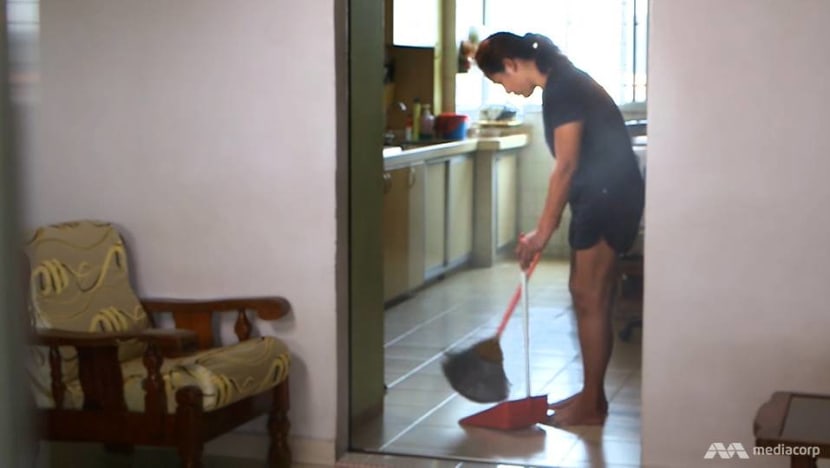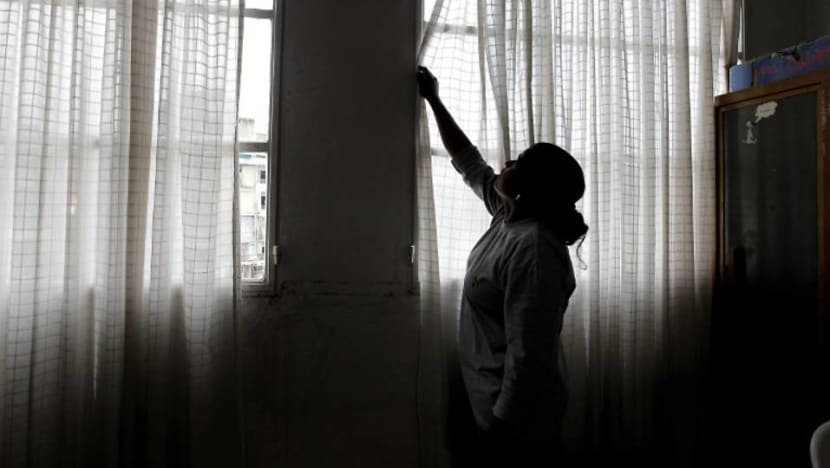commentary Commentary
Commentary: The wrangling over rest days foreign domestic workers and their employers face in Phase 2
As Singapore moves to Phase 2, the rules concerning FDWs on their rest days may get trickier to navigate but more needs to be done to ensure they have enough rest, says Anju Mary Paul.

File photo of a foreign domestic worker. (Photo: AFP)
SINGAPORE: The Singapore Ministry of Manpower has issued new guidelines on foreign domestic workers’ (FDWs) movements after Phase 2 of the post-circuit breaker reopening begins.
During Phase 1, FDWs were advised to “stay at home” during their rest days except when they had to run essential errands. These excursions had to be as short as possible.
Now, with Phase 2, the rules have been relaxed slightly but FDWs are still encouraged to stay at home during their rest day. Like everyone else in Singapore, FDWs can spend their rest day outside, but they need to first seek their employers’ consent and they have been “strongly encouraged” by the Government to schedule them on a weekday rather than the weekend.
On the one hand, this makes sense from a public health point of view and is in line with the other Phase 2 regulations issued that limit social gatherings to groups of five or less, and encourage working from home wherever possible.
On the other hand, these guidelines give employers leeway to impose harsh restrictions on their FDWs’ movements and freedom.
LISTEN: Entering Phase 2: What's behind rules on gatherings, dining, weddings and more?
READ: Filipino community remembers victims of Lucky Plaza accident
They come on top of already weak labour protections regarding FDWs’ rest days, and so are likely to make a bad situation even worse.
REST-LESS IN SINGAPORE
The International Labour Organisation’s Domestic Workers Convention proposes that domestic workers be treated like all other workers in a country in terms of their hours of work, overtime compensation, rest periods, annual leave and sick leave provisions.
Although FDWs in Singapore are entitled to a weekly rest day, there is no legal requirement that their rest day should constitute “one whole day” or a continuous 24-hour period of rest.
In Singapore, the Employment Act stipulates that workers must receive at least “one whole day” of rest in each week, but the Act does not cover domestic workers.
Even though the Ministry of Manpower (MOM) rules stipulate that FDWs are entitled to a weekly rest day, it is not uncommon to read NGO reports of FDWs being given only a few hours off during their rest day (if they even get one) and asked to complete various household tasks either before or after they go out on their rest day.

Employers and FDWs are allowed to negotiate over the number of the rest days workers receive in a month, as long the FDW is paid compensation amounting to one day’s wages, usually about about S$21.50 for wages of S$560 a month.
Yet, we still hear stories of Myanmarese and Indonesian FDWs, and also FDWs on their first contract, “giving up” their weekly rest days to win their employer’s goodwill.
WORRIES OVER WORKING FROM HOME
If the work-from-home restrictions during the circuit breaker have taught us anything, it is that regular rest is essential, and that the blurring of work and home life can cause significant mental stress to workers.
Some of this mental stress comes from the inability to physically disconnect from work because one is always “on”. It is also caused by the social isolation that comes from not being able to mingle and bond with co-workers.
The lack of personal space in the home setting can also be debilitating, especially for individuals who do not have a private room to which they can retreat when they need a break.
READ: Commentary: The coronavirus has made all of us OCD
READ: Commentary: COVID-19 will worsen inequalities across Asia
FDWs were “working from home” long before the circuit breaker. Their place of work – their employer’s home – is also their place of residence. For these reasons, NGOs and migration scholars have long pointed out that live-in domestic work is inherently stressful, and needs more attention from lawmakers.
Even FDWs who are treated like family by their employers understand the reality that their contracts can be terminated at any time by their employer. Live-in domestic work can be extremely isolating because FDWs are not part of a team and do not have co-workers to joke and share responsibilities with.
If live-in domestic work was challenging for FDWs before the coronavirus pandemic, imagine how much harder it is now.
In the past, FDWs could look forward to quiet moments in each day when no one else was at home, to catch a break. This becomes harder if their employers are stuck indoors as well. This leaves only their rest days as a chance to leave their workplace and socialise with friends.
It is understandable that the MOM has encouraged employers to consider giving their FDWs rest days on weekdays, so that FDWs can avoid potentially crowded shopping malls and public spaces on the weekends when the vast majority of Singapore will be out.
But what we should watch for is if an employer forbids their FDW from having a rest day at all, arguing that they do not trust their worker to maintain social distancing, even as the employer now has the freedom to go out whenever they want.

These double standards can breed frustration and resentment among FDWs who may feel that they have to operate under a different set of rules from their employers.
How can we resolve these inequities in a sustainable and fair manner given that we are going to be living in a COVID-19 world for a while?
RESTFUL SOLUTIONS FOR FDWS IN A COVID-19 WORLD
There are concrete steps that can reduce the stress and strain FDWs face. These include policy actions the Government can take to improve the legal protections for FDWs, as well as actions individual employers can take to improve the work environment for their own FDW.
Jeanette Lim, a Clinical Psychologist at the Department of Psychology, Institute of Mental Health, recently suggested a series of actions which office workers can take to reduce their mental stress as they work from home, and many of her suggestions can be extended to how employers treat their FDWs.
Lim emphasises the importance of staying connected via video/phone calls to make up for the fact that you cannot see friends and colleagues in person.
If FDWs have to spend more time at home, then employers should ensure that their FDWs have access to a phone or internet so that they can communicate with their friends in Singapore and relatives overseas on a daily basis.
FDWs should be allowed to coordinate their rest days with their friends so they can try to meet up on a weekday instead.
READ: Commentary: COVID-19 has shown that we can be gracious. How do we make it last?
READ: Commentary: Expect higher levels of anxiety and depression when COVID-19 restrictions lift
Lim also stresses the importance of self-care, including “eating well, sleeping enough, exercising and engaging in leisure activities” on a daily basis. Employers should be required to give their FDWs clearly demarcated rest periods each day when FDWs should be allowed to leave the home and go for a walk even if it is just around the neighbourhood estate.
Many Singaporeans were already doing this, for instance, by relieving their elderly parents’ FDWs on the weekends so that the worker could take the day off. But if FDWs are not allowed to take their rest days on weekends, then employers should ensure alternative relief arrangements are made for weekdays, rather than leaving the worker without rest.
Meanwhile, the Government should implement a 24-hour period of continuous rest rule for FDWs so that their weekly rest “day” is not reduced to a rest “period” or a rest “hour.”
Finally, Lim suggests that “finding reasons to be grateful” and “managing changes with kindness” can improve our mental health.
Employers can build goodwill if they find concrete ways to show their appreciation for the extra carework their FDWs have been providing. An open conversation about how both sides are coping would also help. For the last few months, FDWs have witnessed firsthand the stress their employers are experiencing over job insecurity, reduced paychecks, fears of falling ill, and other disruptions. Talking openly about these challenges will help FDWs understand their employers better.
Meanwhile, most FDWs in Singapore are from Indonesia and the Philippines where coronavirus cases are rising rapidly, and they too are under significant strain as they worry about loved ones who may be sick or unemployed.
And yet, they are here in Singapore, looking after Singapore’s loved ones. Treating them as the essential workers they are would go a long way towards making Singapore a more caring society in the post-COVID-19 future.
READ: Commentary: Here’s what months of food deliveries and takeaways have taught us
BOOKMARK THIS: Our comprehensive coverage of the coronavirus outbreak and its developments
Download our app or subscribe to our Telegram channel for the latest updates on the COVID-19 outbreak: https://cna.asia/telegram
Anju Mary Paul is an associate professor of sociology and public policy at Yale-NUS College in Singapore. Her research specialises in labour migration patterns in Asia and care work policies.














